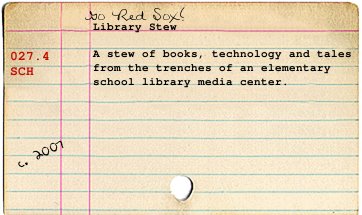One of the big things I have been working on at work the past few weeks is getting together the reading incentive program at my school. Many of the schools in our district have AR (Accelerated Reader) and they use the test results of each student to reward them with little prizes (ice cream, candy, my daughters school has hats etc..). My school has traditionally had a reading program where the students were challenged to read a certain number of books and if they read the books, wrote them down on the sheet provided by the deadline date, they were then invited to a special reading celebration. The reading celebration usually involved an author or illustrator visit. That was all fine and good, but here is my real question for all of this, do contests/programs like this REALLY encourage kids to read more or improve their reading skills?
In talking with some of the students (grades K-5) many of them said that their PARENTS made them participate and some of the smaller kids didn't even know mom & dad had turned in the slip or that they had "won" anything. The kids that are motivated to read in order to be invited to the celebration are usually the kids who would be interested in seeing/hearing a "real live author" speak to them, in other words, the kids who READ anyway and need no motivation to do so.
So there was my question, what kind of program could I instill at my school that would motivate those kids who really HATE to read. Those kids who really struggle to read and because of that HATE to do so. In in a school climate (all over the country,really, not just my school) where test scores seem to be the only indicator of something "successful" what will motivate these kids to read more so that their reading test sores would go up?
Unfortunately, I haven't figured out an answer yet! Part of that reason is, I think I need to look at the students at my school and figure out what would motivate those kids (both boys and girls) who are struggling readers. Somehow a party with an author just isn't it. Reading articles like this at Teacher magazine has helped me to get a little more insight into some things I might do with individual students, but I am looking for something that will motivate the masses (in a school of 1100 students, it is THE MASSES!).
For now, needing to have something to give the Principal, I have dusted off the old reading program, made a few tweeks to it and it will be going out to parents in two weeks. But I think I am going to use this year to really do a little research into WHY the kids who participate do so and what motivates THEM to participate in this. I am working on some things for Children's Book Week in November that I might be able to use as tests for student motivation. I want to see if seeing a professional athlete reading a book to the student motivates them to pick up a book? If listening to a book being read on a podcast or on cd would motivate them? What if the reading contest was more like the baseball playoffs and it was more like a book competition with a big trophy and a party at the end? Somehow, people seem to think trophy's motivate kids, hence why we get a trophy for every season of baseball/football/basketball - enough with the trophy's for just participating, does it really motivate anyone?
Sigh, I wish there was a magic answer to this and the magic answer was, we wouldn't need to motivate anyone to read because everyone loved it and it was part of every student's everyday life. Excuse me while I go find Cinderella in my fantasy world.
Saturday, September 15, 2007
Subscribe to:
Post Comments (Atom)

2 comments:
Good luck with this, Kathy. I'll be very interested to see your results. I wish I had a good answer to suggest for you....
PS. Darned Yankees.
Hi, Kathy. I came over from 7-Imps to read your "Would You? Could You?" answers, and found this great post too. I'd love to hear what you find out from your kids and hope you'll blog about it.
I actually think you do have the right answer: "we wouldn't need to motivate anyone to read because everyone loved it and it was part of every student's everyday life." That last bit, especially. If everyone, and I mean everyone from the principal to the cafeteria workers, read for ten minutes each day, it would be a sea change.
Post a Comment